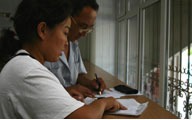
Developing Microcredit Institutions to provide Rural Credit
After Kazakhstan gained its independence in 1991, the country immediately fell into recession. Demand for products from its large industrial sector dried up and oil prices dropped. As state-sponsored companies closed their doors and employees lost their jobs, many Kazakhs became entrepreneurs to pursue new opportunities in the free market. However, a lack of start-up capital proved to be a significant obstacle to many.
Recognizing the absence of microcredit organizations as a problem for small and medium-sized enterprises in emerging and transitional markets like Kazakhstan’s, ACDI/VOCA stepped in to create Kazakhstan’s first-ever microcredit program in 1996. With funding from USAID, the Soros Foundation and the Eurasia Foundation, ACDI/VOCA and several other organizations conducted 10 months of negotiations with the Kazakh government and banking officials to write new regulations enabling non-banking financial organizations to provide small working-capital loans. This work led to the establishment of ACDI/VOCA’s Kazakhstan Community Loan Fund project (KCLF), the country’s first non-bank financial institution and, until 2001, the sole microenterprise institution that could legally disburse loans and report directly to the Kazakh Central Bank. The project paved the way for other NGOs to become legal entities and introduced to Kazakhstanis the formerly unknown concept of non-collateralized microlending.
ACDI/VOCA’s KCLF created the microfinance institution Kazakhstan Loan Fund (KLF)—known now as KazMicroFinance LLC (KMF)—which remains self-sustainable since ACDI/VOCA closed out its project in 2002 and began disbursing loans the year following its founding. It has enjoyed great success in applying individual and group lending methodologies to provide small stepped loans that are designed to measure client creditworthiness over a period of time and to help guarantee repayment.
Although the original USAID program has ended, ACDI/VOCA continued to support KMF as a component of ACDI/VOCA’s Central Asian Micro Finance Alliance Project, which ended in 2006, by providing technical assistance and sits on its board of directors to provide strategic guidance. KMF has taken a leading role in supporting and training other microfinance institutions in Central Asia. It provided training to hundreds of representatives from other MFIs who are interested in learning from KMF successes. In 2002 KMF was reviewed and rated by an independent rating agency, Microcredit Ratings and Guarantees India, Ltd., and received an alpha rating. The assessment highly recommended KMF as a microcredit institution, pointing to its low risk and good systems. KMF has been rated several times since and publishes its financial information on a regular basis in the Microbanking Bulletin.
Today KMF is transitioning from its nonprofit status to for-profit KMF bank and borrows commercially. KMF’s current outstanding portfolio over $100 million and they have almost 100,000 clients. It has branches in 14 major cities, 10 regions and 60 districts. During its 15 years of activities, KMF has issued more than 550,000 loans.
The KMF staff is responsible for the financial analysis of the program including making financial projections and assessing current financial performance. KMF remains dedicated to one of its original central purposes: to support female entrepreneurs’ needs for small-scale loans in remote areas. The staff continues to develop and monitor its own institutional benchmarks and makes long-term strategic plans and budgets. Project staff maintains all programmatic systems and manages internal training and human resources development. KMF is succeeding because of its committed and well-trained staff, which early on established a high-quality lending culture among its clients that demanded responsible borrowing.



